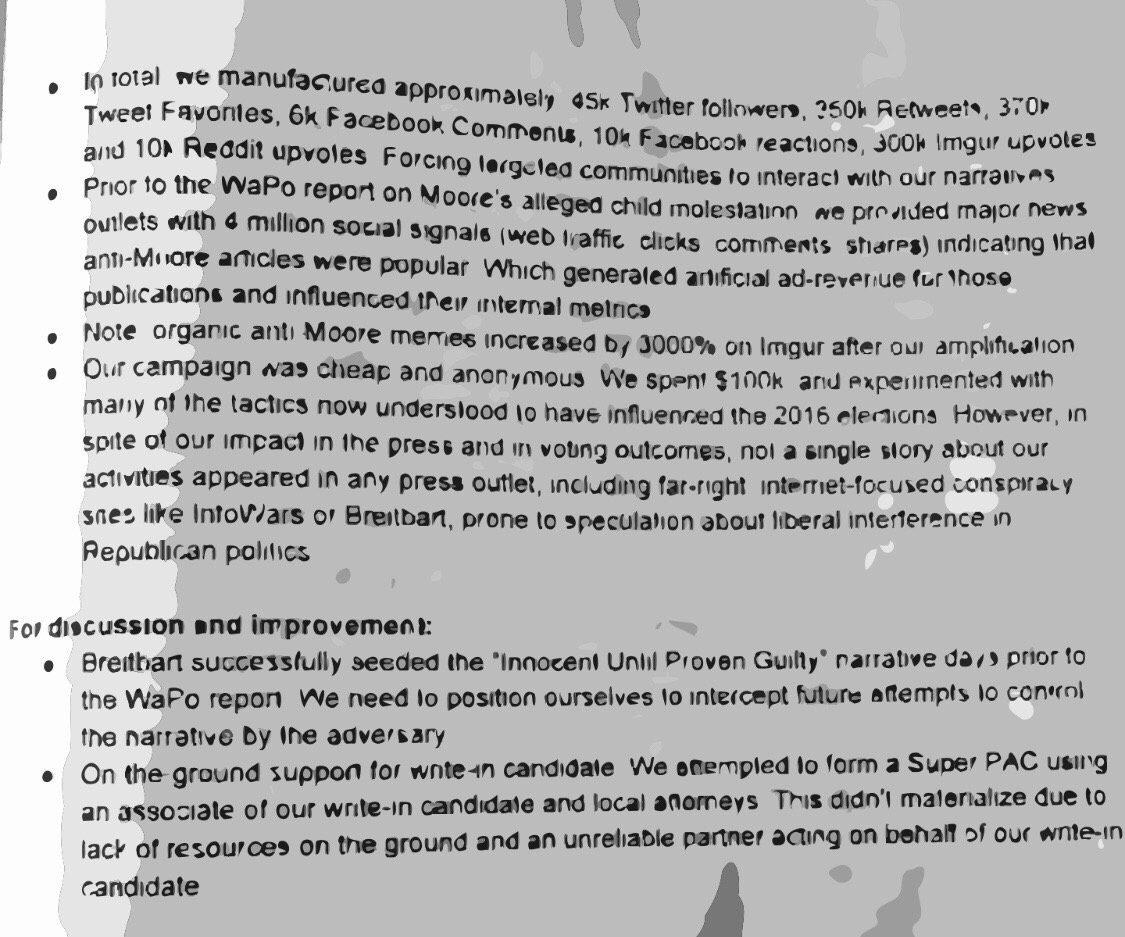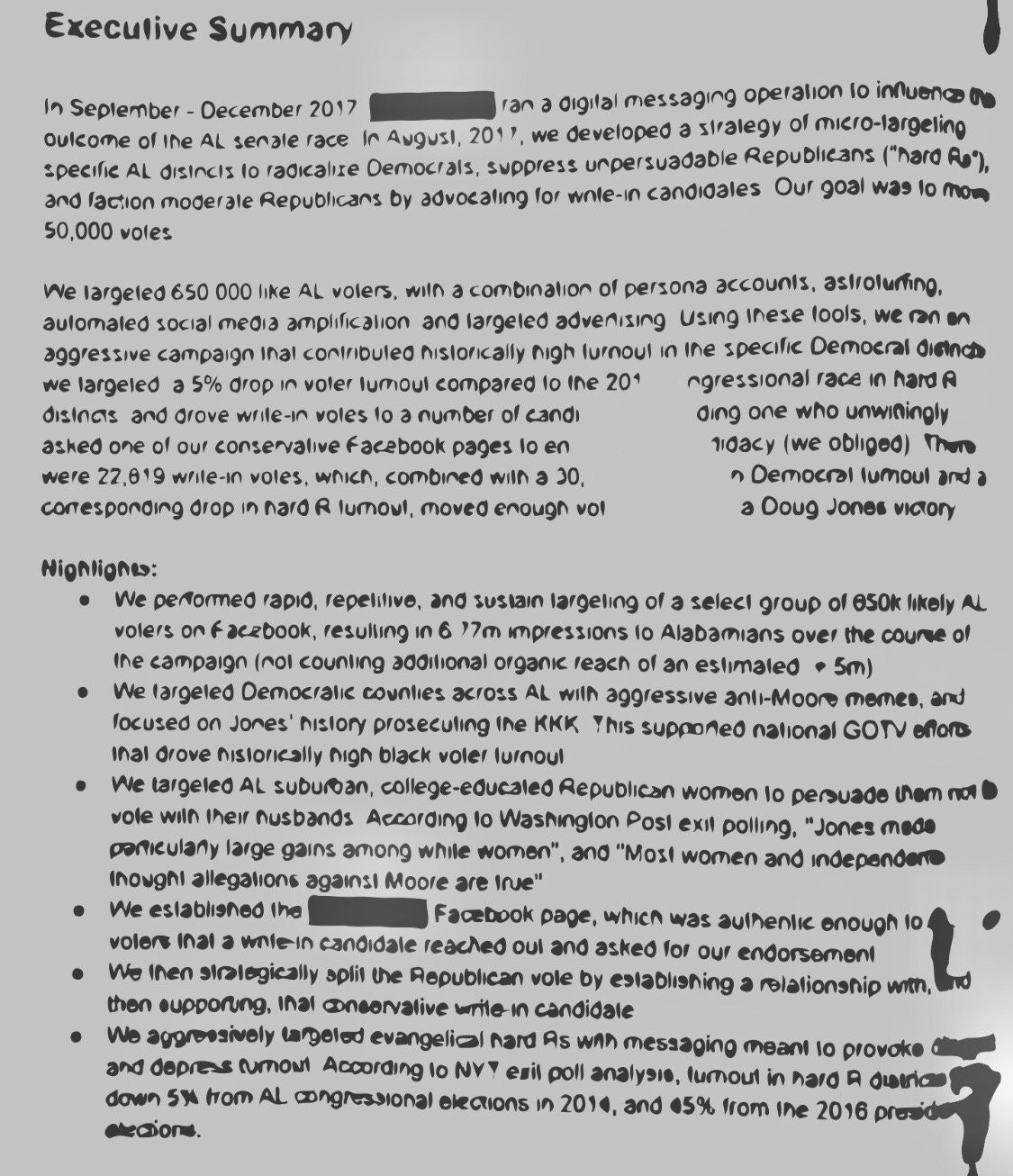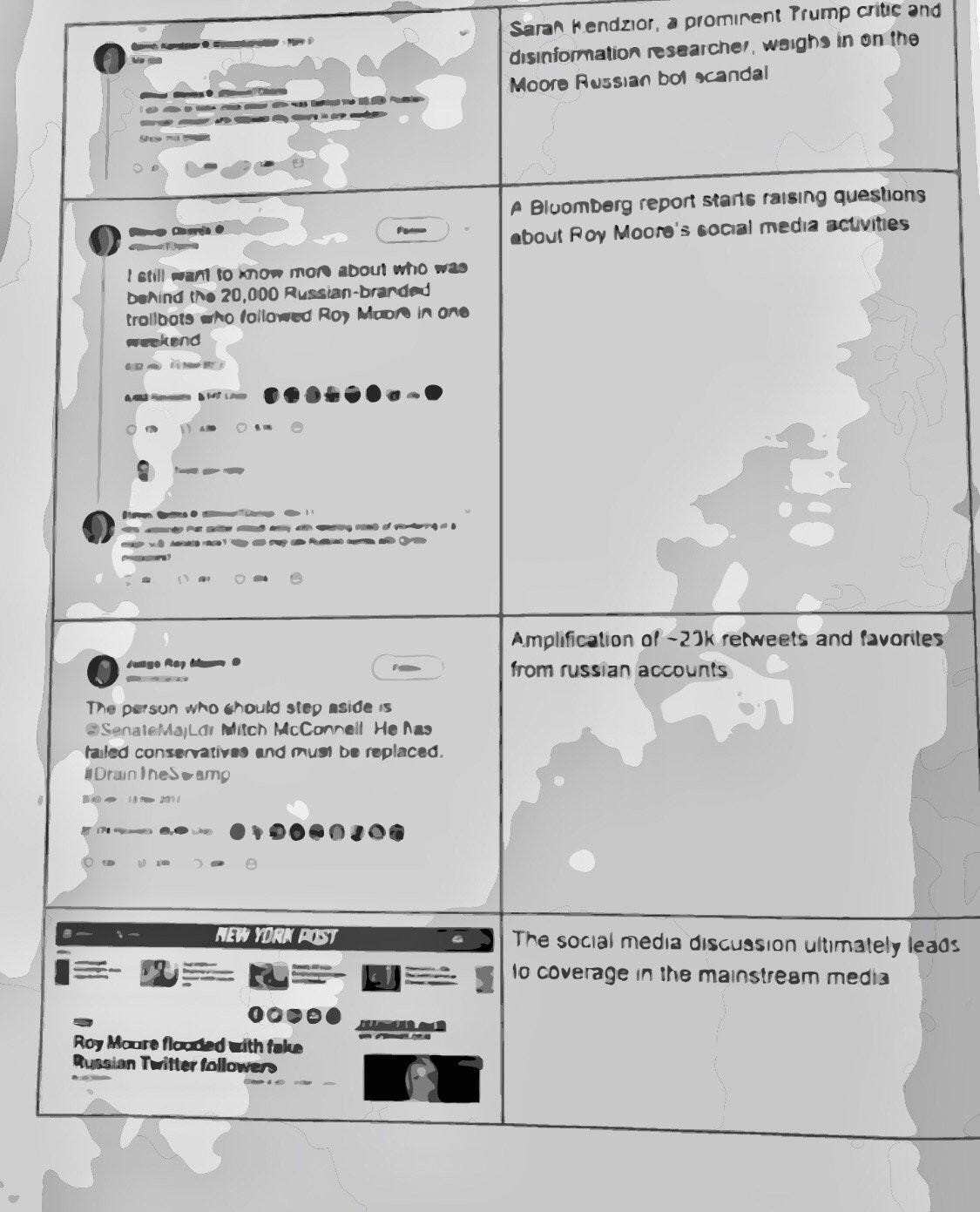Hamilton 68 developer ran 'false flag operation’ in 2017 Alabama election and wrote Senate Intelligence Committee Report on Russian interference
Revelations that the Hamilton 68 dashboard tracked U.S. citizens recall role of New Knowledge founder, who ran an election interference campaign before writing Senate report on Russian interference
New Knowledge founders Jonathon Morgan (L) and Ryan Fox (R)
Editor’s note: In December 2018, I published two investigations into New Knowledge, a cyber-intelligence firm that was commissioned to produce a report for the Senate Intelligence Committee on Russian disinformation, and ran an interference campaign into the Alabama special senate race to replace Jeff Sessions, who had been appointed at U.S. Attorney General.
In the wake of the scandal, New Knowledge underwent a Blackwater-style rebrand, calling itself Yonder. In June 2022, the company was purchased by Primer AI, a larger private intelligence firm staffed with Silicon Valley executives and former high-ranking U.S. military and intelligence figures. Ironically, the acquisition was billed as “enhancing our ability to combat disinformation attacks.”
As my original investigation revealed, Jonathon Morgan, one of the founders of New Knowledge/Yonder, who had previously been a special advisor the Obama White House and State Department and DARPA technologist, was involved in development of the now-infamous Hamilton 68 dashboard.
In light of the recent revelations by journalist Matt Taibbi that Twitter knew the supposed Russian bot tracker was actually tracking ordinary Americans, I have reposted the investigations below.
Senate report on Russian interference was written by disinformation warriors behind Alabama ‘false flag operation’
Hailed by Congress and the media as defenders of democracy, high-tech Russiagate hustlers Jonathon Morgan and Ryan Fox have been exposed for waging “an elaborate ‘false flag’ operation” to swing the 2017 Alabama senate race.
By Dan Cohen
On December 17, two reports detailing ongoing Russian interference operations commissioned by the Senate Intelligence Committee were made public. They generated a week’s worth of headlines and sent members of Congress and cable news pundits into a Cold War frenzy. According to the report, everything from the Green Party’s Jill Stein to Instagram to Pokemon Go to the African American population had been used and confused by the deceptive Facebook pages of a private Russian troll farm called the Internet Research Agency.
Nevermind that 56% of the troll farm’s pages appeared after the election, that 25% of them were seen by no one, or that their miniscule online presence paled in comparison to the millions of dollars spent on social media by the two major presidential campaigns and their supporters to sway voters. This was an act of war that demanded immediate government action.
According to Sen. Mark Warner, the Democratic chair of the Senate Intelligence Committee, the reports were “a wake up call” and a “bombshell” that was certain to bring “long-overdue guardrails when it comes to social media”. His Republican counterpart on the committee, North Carolina Senator Richard Burr, hailed the research papers as “proof positive that one of the most important things we can do is increase information sharing between the social media companies who can identify disinformation campaigns and the third-party experts who can analyze them.”
But the authors of one of the reports soon suffered a major blow to their credibility when it was revealed that they had engaged in what they called a “Russian style” online disinformation operation aimed to swing a hotly contested special senate election. The embarrassing revelation has already resulted in one of the authors having his Facebook page suspended.
The well-funded deception was carried out by New Knowledge, a private cyber intelligence firm founded by two self-styled disinformation experts who are veterans of the Obama administration: Jonathon Morgan and Ryan Fox.
‘It may be designed to manipulate you’
Morgan began his career as a product manager at AOL before founding a series of start ups, some with funding from the United States Agency for International Development and Silicon Valley billionaire Pierre Omidyar’s Omidyar Network. Once a Brookings Institution researcher and special advisor to the Obama White House and State Department, Morgan founded Data for Democracy, a volunteer organization said to use “public data to monitor the election system for signs of fraud.” Morgan also developed technology for the Defense Advanced Research Projects Agency (DARPA), the arm of the Department of Defense created for basic, applied technological research, and futuristic war toys.
Rising through the ranks of the national security apparatus, Morgan ultimately emerged as a go-to source for credulous reporters seeking to blame Hillary Clinton’s loss to Donald Trump on Russian disinformation.
In an interview with the local CBS affiliate in Austin, Texas, Morgan told viewers that feelings of discontent were telltale signs that they had been duped by Russian disinformation. “If it makes you feel too angry or really provokes that type of almost tribal response, then it may be designed to manipulate you… People should be concerned about things that encourage them to change their behavior,” he warned.
Fox, for his part, is a 15-year veteran of the National Security Agency and was a computer analyst for the Joint Special Operations Command (JSOC) military unit. JSOC is notorious for its spree of atrocities across the Middle East including digging their bullets out of dead pregnant women’s bodies in Afghanistan. Comparatively little information is available about Fox’s background.
Since receiving an $11 million investment from venture capital firm, GGV Capital, in August 2017, New Knowledge has positioned itself as one of the leading private intelligence firms taking on the scourge of Russian disinformation. The outfit made its biggest splash on December 17th when it published one of the two Senate Intelligence Committee-commissioned reports.
The report, titled “The Tactics and Tropes of the Internet Research Agency,” was oversseen by Renee DiResta, a former Wall Street trader and tech specialist who was recruited by Obama’s State Department to devise strategies for combating online ISIS propaganda. The New York Times described DiResta as one among a small group of “hobbyists” who “meticulously logged data and published reports on how easy it was to manipulate social media platforms.”
The hobby lobby of online obsessives converged at New Knowledge this year to sound the alarm on supposed Russian disinformation. In a New York Times op-ed published as Americans went to cast their votes in the midterm elections, Morgan and Fox alleged that the Kremlin was secretly running hundreds of propaganda websites in an effort to swing the outcomes. That assertion ran counter to the narrative the two operatives had been spinning out just months before.
In an interview earlier in the year, Ryan Fox suggested that despite the Trump administration’s multiple rounds of sanctions against Russia, Vladimir Putin was so satisfied with the state of U.S. affairs that the Kremlin had actually cut back on its supposed interference. “Strategically, are they content with the way things are? Does it play in their favor to do anything right now? That’s a valid question,” Fox said. “Keep up the momentum, keep poking away. But do they have to implement drastic measures like hacking the DNC and exposing thousands of emails? Probably not.”
More recently, Fox claimed to have identified hundreds of Russian-controlled Facebook and Twitter accounts active in France’s Yellow Vest movement, which has raged against the country’s neoliberal leadership and sparked anxiety among centrist elites across the Atlantic.
However, Fox produced no evidence to support his incendiary accusation, prompting reporters to qualify his assertions as “very likely” and write that he merely “believes” Russian interference took place.
Drafting the dubious bot dashboard
Morgan is also one the developers of the Hamilton 68 dashboard, an online project dedicated to inflaming public outrage over online Russian bots. Funded by the German Marshall Fund’s Alliance for Securing Democracy – which is itself backed by NATO and USAID – Hamilton 68 claims to track hundreds of accounts supposedly linked to Russian influence operations. The effort has largely succeeded in drawing positive media attention despite one of its founders, Clint Watts, admitting that the Twitter accounts it follows may actually be real people who are not Russian at all.
When Morgan was asked what techniques Hamilton 68 uses to identify Russian influence operations, he offered a confident-sounding but ultimately empty answer: “We developed some techniques for determining who matters in a conversation… Using some of those techniques, we’ve identified a subset of accounts that we’re very confident are core to furthering the Russian narrative in response to mainstream events.”
Because Morgan and his colleagues have explicitly refused to name the accounts monitored by Hamilton 68, his claims can never be proven.
In a lengthy profile of the musicologist-turned-New Knowledge “online detective” Kris Shaffer, Foreign Policy described the supposed methodology he employed to identify Russian disinfo operations: “By working with massive datasets of tweets, Facebook posts, and online articles, he is able to map links between accounts, similarities in the messages they post, and shared computer infrastructure.”
The article added an extraordinarily revealing disclaimer: “This method of analysis is in its infancy, remains a fairly blunt instrument, and still requires human intervention. It sometimes mistakes real people who post anti-imperialist arguments about U.S. foreign policy for Kremlin trolls, for example.”
It may have been that New Knowledge had no knowledge at all of Kremlin botnets, but their reports were nonetheless treated as gospel by droves of credulous reporters eager to make their name in the frenzied atmosphere of Russiagate.
“We orchestrated an elaborate ‘false flag’ operation”
According to an internal New Knowledge report first seen by the New York Times, the firm carried out a multi-faceted influence operation designed to undermine a 2017 bid by right-wing Republican former state supreme court judge Roy Moore for an open Alabama senate seat. By its own admission, New Knowledge’s campaign capitalized on the the sexual assault allegations against Moore to “enrage and energize Democrats” and “depress turnout” among Republicans.
To accomplish this, the New Knowledge team created a Facebook page aimed at appealing to conservative Alabamians by encouraging them to endorse an obscure patio supply salesman-turned-write-in candidate named Mac Watson. They hoped the subterfuge would peel votes away from Moore. It was precisely the kind of tactic that New Knowledge claims Russian troll farms carry out to sow divisions among the American electorate.
Morgan told the New York Times the effort stopped there. But the New Knowledge report says the Facebook page “boosted” Watson’s campaign and even arranged interviews for him with The Montgomery Advertiser and the Washington Post. At the same time, Watson’s Twitter following mysteriously jumped from 100 to about 10,000.
One of the articles New Knowledge took credit for during its investigation
Of the dozens of conservative Alabamian Facebook pages the Watson campaign messaged, the New Knowledge-run page was the only one that responded to it. “You are in a particularly interesting position and from what we have read of your politics, we would be inclined to endorse you”, they wrote. New Knowledge then “asked Mr. Watson whether he trusted anyone to set up a super PAC that could receive funding and offered advice on how to sharpen his appeal to disenchanted Republican voters.”
While Watson communicated with the deceptive Facebook page, the New Knowledge operators never revealed their identity, and the page disappeared the day after the vote. “It was weird,” Watson commented to the New York Times. “The whole thing was weird.”
New Knowledge then sought to manufacture a link between Roy Moore’s campaign and the Kremlin by claiming thousands of his Twitter followers were Russian bots. Mainstream media outlets credulously ran with the narrative, insinuating that the Christian theocrat Moore was secretly backed by Russia.
The Montgomery Observer first reported the alleged link: Russian invasion? Roy Moore sees spike in Twitter followers from land of Putin. From there, it was picked up by Mother Jones, whose headline read: Russian Propagandists Are Pushing for Roy Moore to Win. But there was no proof of any Russian connection to the accounts. To bolster its evidence-free claim, Mother Jones simply turned to Hamilton 68, the highly suspect Russian influence monitoring system that Morgan helped design.
Today, as can be seen below, Mother Jones is using a bogus story generated by a disinformation campaign to raise funds for more Russiagate coverage.
As the Russian bot narrative peaked, Moore blamed the Jones campaign for manufacturing the scare. “It’s not surprising that they’d choose the favorite topic of MSNBC and the Fake News outlets — the Russia conspiracy. Democrats can’t win this election on the issues and their desperation is on full display.”
Moore’s opponent, Jones, said he had no knowledge of the operation.
Moore was roundly mocked in liberal circles as a conspiratorial crank, but New Knowledge’s internal report contained a stunning admission: “We orchestrated an elaborate ‘false flag’ operation that planted the idea that the Moore campaign was amplified on social media by a Russian botnet,” its authors revealed.
While the New York Times says the internal report does not confirm that New Knowledge purchased the bot account themselves, the accounts’ flagrant use of Cyrillic language and profile pictures of famous singers including Britney Spears, Christina Aguilera and Avril Lavigne strongly suggest that whoever bought them went to extreme lengths to leave the appearance of a Russian hand.
Disinfo ops to “strengthen American democracy”
The Alabama disinformation campaign was carried out through a network of Silicon Valley tech entrepreneurs and former Obama administration officials who have joined the private sector to leverage liberal anti-Trump outrage into profits.
Billionaire Reid Hoffman, who co-founded the employment networking site LinkedIn, provided $100,000 for the black ops campaign. The money was then pipelined through American Engagement Technologies, which is headed by Mikey Dickerson, a former Google engineer who founded the United State Digital Service. Dickerson is also Executive Director of the New Data Project, an organization dedicated to “testing new approaches” and “serving as an advanced technology research lab for progressives.”
A colleague of Hoffman’s claimed the purpose of his investments was to “strengthen American democracy.”
Since the New York Times’ exposé, Facebook released a statement announcing its suspension of “five accounts run by a multiple individuals for engaging in coordinated inauthentic behavior,” including Morgan’s account. The social media platform has opened an investigation, though it has not revealed what the other pages are or who operated them.
The headline of the New York Times story about the Facebook suspensions appeared to have been crafted to keep the focus on Russia while deflecting scrutiny from the group of Democratic Party-linked hustlers that orchestrated the disinformation operation. It read: “Facebook Closes 5 Accounts Tied to Russia-Like Tactics in Alabama Senate Race.”
For his part, Sen. Jones has demanded an investigation. “I think we’ve all focused too much on just the Russians and not picked up on the fact that some nefarious groups, whether they’re right or left, could take those same playbooks and start interfering with the elections for their own benefit,” he said. “I’d like to see the Federal Election Commission and the Justice Department look at this to see if there were any laws being violated and, if there were, prosecute those responsible.”
Facing an inquiry for possible violations of election laws, Morgan issued a mealy-mouthed statement claiming he “did not participate in any campaign to influence the public and any characterization to the contrary misrepresents the research goals, methods and outcome of the project.”
Johnathan Morgan’s since-deleted tweet
While the impact of the disinformation campaign on the Alabama senate race may never be quantified, the cynicism behind it is hard to understate. A group of Democratic Party operatives with close ties to the national security state waged a cynical campaign of online deception against the American public, while marketing themselves as the guardians against from foreign interference. Few, if any, Russian hackers could have done as much damage to the already worn fabric of American democracy as they have.
Part 2:
How New York Times’ Scott Shane covered for architects of a shocking “false flag” election campaign in Alabama
The NY Times national security reporter held news of a massive voter manipulation campaign while pumping up the political operatives behind it as ace Russian disinformation detectives.
By Dan Cohen
In September 2018, New York Times national security reporter Scott Shane attended an off-the-record event in Washington, DC held by American Engagement Technologies, a data firm run by Obama administration veteran Mikey Dickerson. Shane was not there simply as an observer – he was invited to speak on his supposed subject of expertise: “Soviet and Russian disinformation.”
It was at that meeting where Shane learned of “Project Birmingham,” an online disinformation campaign waged against voters in the 2017 Alabama senate race between Republican Roy Moore and its eventual winner, Democrat Doug Jones.
The plot involved voter suppression tactics, including what its architects called an “elaborate false flag operation” that aimed to convince voters that the Kremlin was supporting Moore through thousands of fake Russian bots. The campaign also involved a phony Facebook page that encouraged Alabamians to vote for an obscure write-in Republican candidate, arranged interviews for him in major newspapers and even sought to arrange SuperPAC funding for his campaign.
But as Shane learned, this deception wasn’t the work of the Kremlin or financed by Russian oligarchs. It was a mass manipulation carried out by a private cyber intelligence firm run by Democratic operatives called New Knowledge. And it was run in conjunction with AET – the firm that had invited him to its secret meeting.
‘No special relationship, nothing to disclose’
For more than two months, Shane concealed the shocking truth about the disinformation campaign that targeted unsuspecting voters in the 2017 Alabama special senate race. During that period, he published an article pumping up a half-baked report commissioned by the Senate Intelligence Committee that purported to prove that a privately-owned Russian troll farm called the Internet Research Agency used social media platforms like Instagram and Pokemon Go to elect Donald Trump and keep him in power.
Shane’s article on the Senate report omitted any mention of the manipulation plot that its authors had just waged in Alabama — a revelation that would have demolished their credibility. Instead, the reporter breathlessly trumpeted the Senate Intelligence Report authored by those same operatives, claiming it provided “new details to the portrait that has emerged over the last two years of the energy and imagination of the Russian effort to sway American opinion and divide the country.”
It was not until December 19th, with the congressional midterm elections safely in the rearview mirror, that Shane finally revealed the existence of the Alabama disinformation campaign to the public. His report described a heavily sanitized version of events and seemed to justify the campaign under the pretext of imitating Russian tactics for research purposes.
Shane’s article quoted New Knowledge CEO Jonathon Morgan downplaying the impact of the propaganda operation he had enacted. “The research project was intended to help us understand how these kind of campaigns operated… We thought it was useful to work in the context of a real election but design it to have almost no impact,” Morgan assured readers.
Days later, Buzzfeed News reporter Craig Silverman revealed that Shane had signed a non-disclosure agreement with AET. When journalist Yasha Levine confronted Shane about not revealing the NDA he signed with AET, Shane dismissed the concerns and assured him that such arrangements as “totally routine in journalism.” Shane claimed that the Alabama disinformation story was outside of the scope of the non-disclosure and equated the it to an off-the-record agreement – a common practice among journalists whose sources wish to remain anonymous.
“I have no special relationship with folks at the meeting. Nothing to disclose,” Shane insisted.
Shane had never acknowledged having signed a non-disclosure agreement until it was revealed in Buzzfeed. So the question lingered: What else does the reporter know that the NDA bars him from publicizing? If there was more that Shane knew but was legally forbidden from reporting, his coverage of the Alabama operation was a classic case of what intelligence professionals like to refer to as a limited hangout.
“The man just simply can’t be trusted”
John Kiriakou, the whistleblower who spent 23 months in prison for revealing details of the secret CIA torture program, pointed to Shane’s omission as a clear breach of journalistic ethics.
“Scott Shane may be a great reporter,” Kiriakou told me. “He may be a Pulitzer prize winner, but the man just simply can’t be trusted.”
According to Kiriakou, Shane had violated an agreement he made just weeks before he began his prison sentence began in 2013.
Kiriakou says he allowed Shane to shadow him for a profile piece, but on one condition: to avoid angering the judge with unwanted publicity, Shane had to wait to publish his story until after Kiriakou’s formal sentencing.
Shane agreed to the condition, Kiriakou recalled. Yet when the reporter learned that The New Yorker was readying its own profile of Kiriakou, Shane’s competitive instincts kicked in. According to Kiriakou, the reporter broke the agreement and published the story on January 5th, nearly three weeks ahead of Kiriakou’s sentencing date.
The judge was livid at the high-profile case being back in the public spotlight, Kiriakou recalled, and lamented that she could not punish him with the heaviest sentence possible.
‘Moved enough votes to ensure a Doug Jones victory’
Since Shane’s December 19th report, new documents have come to light revealing that the covert psychological operation may have proven decisive in Senator Doug Jones’ come-from-behind victory. The content of the documents stood in stark contrast to public statements by New Knowledge operatives and coverage by Shane that downplayed the impact of the disinformation campaign.
On December 27th, a partial version of a report entitled “Project Birmingham Debrief” was made public by blogger Jeff Gisea. The New York Times and Washington Post have since obtained the full 12-page internal document, however, they have refused to release it to the public.
According to the document, Alabama operation targeted 650,000 voters – nearly 20% of the estimated 3.3 million registered voters in the state – and aimed to “move 50,000 votes.”
To accomplish this goal, New Knowledge crafted an “aggressive campaign” that was carried out over a five-month period beginning in August 2018 that sought to “influence the outcome of the AL [Alabama] senate race.”
The firm developed a three-part strategy of “micro-targeting specific districts to radicalize Democrats, suppress unpersuadable Republicans, (‘hard Rs’) and faction moderate Republicans by advocating for write-in candidate.” This was implemented through a “combination of persona accounts, astroturfing, automated social media amplification, and targeted advertising.”
The report claimed that New Knowledge’s black operations campaign was wildly successful, achieving a “30, [redacted] Democratic turnout and a corresponding drop in R [Republican] turnout” that “moved enough votes to ensure a Doug Jones victory”
Considering that Jones won the race by just 21,311 of more than 1.3 million votes, New Knowledge’s influence operation may indeed have proven decisive. If it reached even half of its goal, then the cyber-meddling firm could plausibly credit for the election of Doug Jones.
Then again, there is the possibility that these ethically challenged Democratic consultants were hyping their achievements in Alabama to rustle up new contracts for future campaigns of voter manipulation.
Boasts of secrecy, deception and successful subversion
New Knowledge acknowledged its attempt to split the Republican vote by establishing a special relationship with a patio supply salesman-turned Republican write-in candidate named Mac Watson. The data firm covertly operated a Facebook page to generate support for Watson and arranged interviews for him in the Montgomery Advertiser and even the Washington Post. The day after the campaign was over, the Facebook page disappeared. “It was a group that, like, honest to God, next day was gone,” Watson told the NYT’s Shane.
The Project Birmingham document revealing details of the disinformation campaign also boasted that its authors were able to manipulate media outlets while maintaining a total veil of secrecy. “In spite of our impact in the press and in voting outcomes, not a single story about our activities appeared in any press outlet,” they declared.
In a section entitled, “For discussion and improvement”, the report suggested the influence campaign provided useful lessons for future psy-op campaigns and could help “position ourselves to intercept future attempts to control the narrative by the adversary.”
That subheading also emphasized the usefulness of secret Super PAC backing for write-in candidates who can play a spoiler role in hotly contested elections.
The tactic that damaged Moore the most entailed the mass purchase of Cyrillic-speaking bots to follow his Twitter account and create the impression that the Kremlin was boosting his candidacy. It is unclear still who orchestrated the purchase. But the Project Birmingham report touted the deception as a signal achievement and singled out the Twitter influencers who boosted it.
The top influencers singled out in the account were self-styled “authoritarianism expert” and former Freedom House staffer Sarah Kendzior, Bloomberg News reporter Steven Dennis and New York Post’s Jao Tacopino. It is unclear if they were aware of the nature of the campaign they participated in — if they were, in the words of former Clinton campaign manager Robby Mook, “unwitting accomplices.”
New Knowledge’s Jonathon Morgan has attempted to escape scrutiny by denying the explosive allegations about his activities in Alabama. “We did not write the leaked report and we could not have because it didn’t reflect our research. The leaked version of the report made a number of claims that did not originate with us,” he claimed.
Morgan also insisted that he thought the trolls used in the “false flag operation” were random users and not Russian-backed: “I assumed at the time that this was the work of internet trolls — because genuine state sponsors of disinformation are adept at appearing to be domestic commentators,” he said.
During the height of the the Alabama race, however, Morgan cited Hamilton 68 — a supposed Russian influence tracker he had a central role in designing — to claim that Russian trolls were, in fact, meddling in the Alabama race. His tweet indicated a desire to amplify the so-called “false flag operation” against Moore.
‘We probably do it to each other’
Renee DiResta, a self-styled counter-disinformation specialist, helped oversee the Project Birmingham disinformation operation, has stayed quiet about the devious propaganda effort she waged. DiResta is a former advisor to the U.S. Army Cyber Command who testified before the Senate Intelligence Committee on August 1, 2018 on “Russian attempts to manipulate social media platforms.”
But this January 2nd, she chose to break her silence by making appearance on Waking Up, the podcast hosted by celebrity atheist-neocon and race science proponent Sam Harris. The anti-religion pundit pitched a series of softball questions to DiResta about Russian interference in the 2016 election while omitting any mention of Project Birmingham.
“It happened. There’s really nothing else to say about it,” DiResta declared. “The intelligences agencies know it happened; foreign governments know it happened; researchers know it happened; the platforms acknowledge it happened. I mean, sure, there can be some small group of people who continues to, you know, live like ostriches but that doesn’t mean that it didn’t happen.”
Harris, a leading figure in the New Atheist movement who wrote that “believing strongly, without evidence, is considered a mark of madness or stupidity,” faithfully accepted DiResta’s evidence-free claims as if they were holy gospel handed down by an apostle.
When Harris asked how DiResta she responded to the fact that the United States interfered in affairs of other countries, she made what read like an admission of her own role in Project Birmingham. “We probably do it to each other at this point, right? There’s evidence of that as far back as 2016 – some things that, insinuations about Alabama. There’s a whole lot of, lot of, you know, evidence that domestic groups can and do do this as well.”
Harris made no attempt to follow-up with a question about her involvement in the Alabama black operations campaign.
Escaping unscathed
Weeks after the Alabama scandal erupted, New Knowledge has emerged unscathed. It is as through the disinformation warriors had not just waged a sophisticated campaign of mass deception in a federal election. Today, their firm remains a go-to source for Western reporters writing about the supposed dangers of Russian disinformation.
In a glowing profile, BBC reporter Mike Wendling wrote that New Knowledge is “at the forefront of the investigation into the Kremlin-linked Internet Research Agency and other disinformation campaigns” while whitewashing its disinformation operation as mere “involvement in a project during the US Senate race in Alabama.”
On December 27th, Alabama Attorney General Steve Marshall announced that his office was collecting information for a possible probe. Since then, he has kept mum on the matter.
While scrutiny of New Knowledge and its attack on American democracy remains confined to social media, the NYT’s Shane has moved on to the latest Russiagate uproar.
On January 18, Shane pronounced that Buzzfeed’s report alleging that Trump instructed his lawyer, Michael Cohen, to lie about his business discussions with Russians, would “turn out to be solid.” Jason Leopold, a co-author of that report, replied, “Appreciate that, Scott.”
That evening Robert Mueller’s spokesmen issued a rare statement, declaring that the Buzzfeed report was “not accurate.”
Images of the “Project Birmingham Debrief” are below:
These investigations were originally published in The Grayzone.












